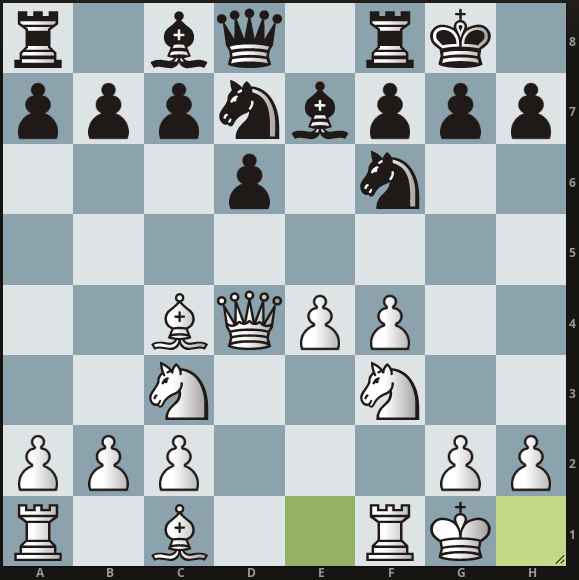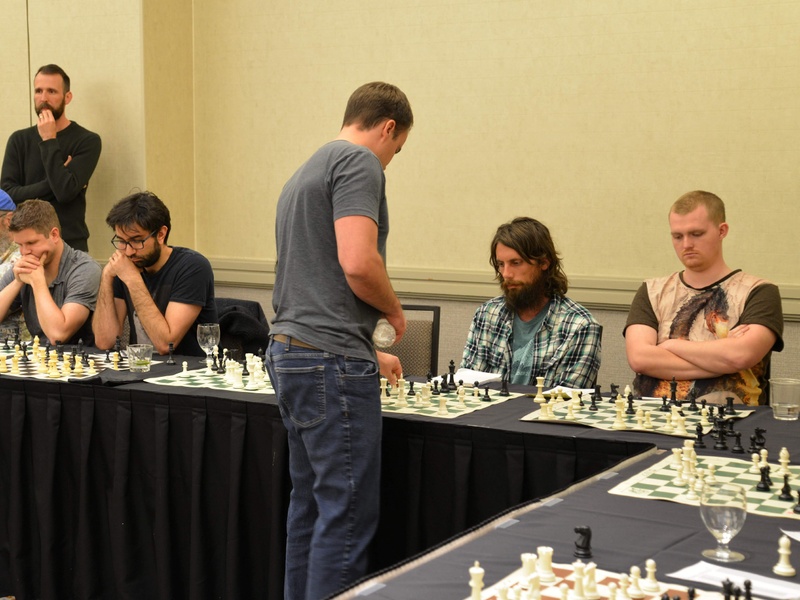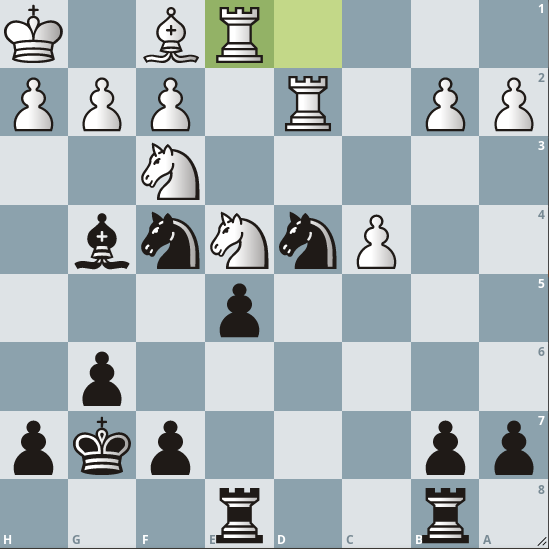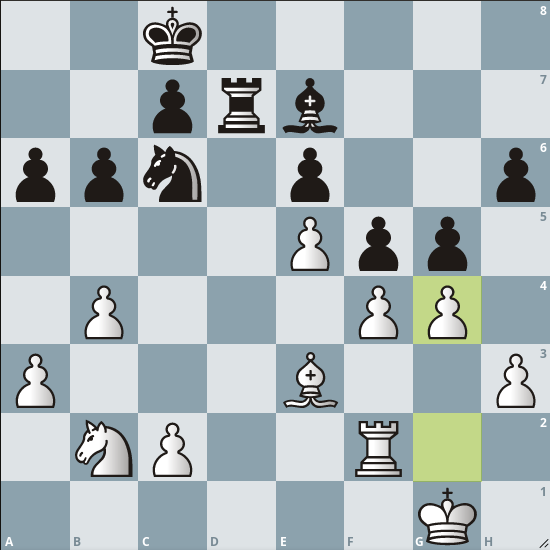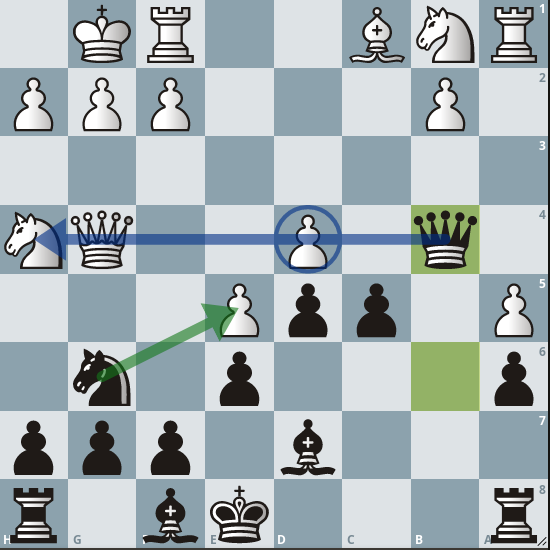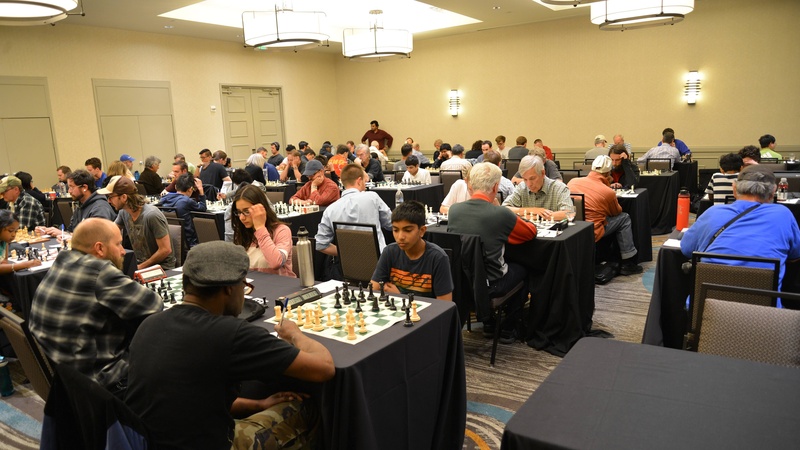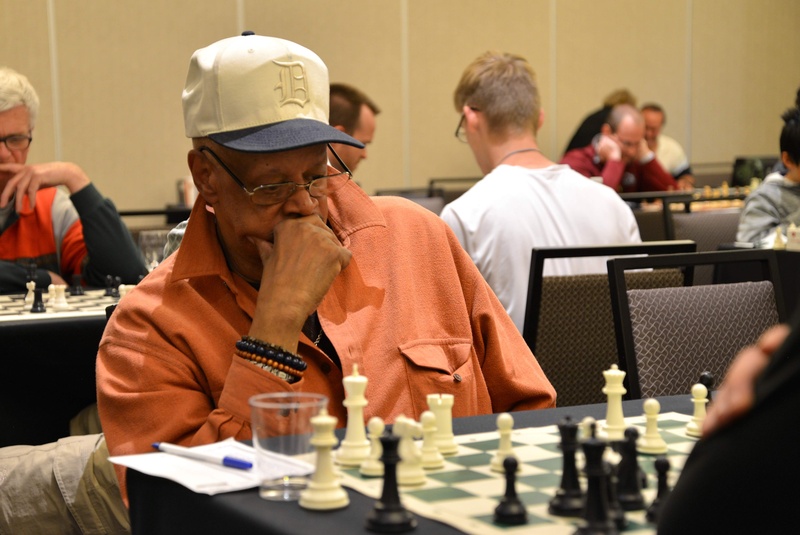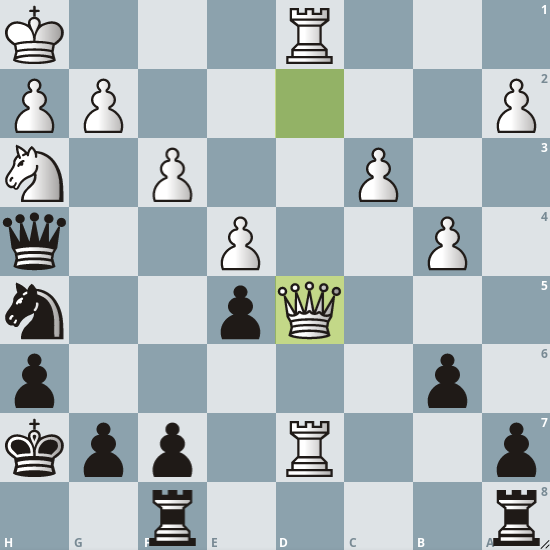Tournament Report: Denver Open 2019 (my first chess tournament!)
Introduction: My first chess tournament
I’ve heard repeatedly that one of the best ways to improve at chess is to start playing long over-the-board games. It’s advice that makes sense to me: I think it is the act of concentrating on a position that really develops efficient calculation. So I looked online earlier this year and found a small (there are usually 2-4 of us there) chess club that meets weekly one town over. In March I also saw that the Denver Chess Club (DCC)'s 2019 Denver Open was a month away — I made it my goal to prepare for and play in that.
By “prepare for” I thought I would work on my lichess tactics rating, go over some chapters of De la Villa’s 100 Endgames You Must Know, and maybe learn a bit of theory in the openings I like to play (Scotch game and French defense). None of that happened, but I signed up for the tournament anyway! And at least at chess club I got used to playing with a clock and writing my moves down, two aspects of tournament chess I’d never practiced before.
In order to sign up for the tournament I joined the USCF, the CSCA, the DCC, paid the extra $30 to play IM Daniel Rensch in a simultaneous exhibition, and rented two nights in a nearby motel to avoid an impractical 3+ hours of public transit every day. I think the whole experience came out to about $50 per game, but that will be amortized as I continue to attend DCC events (which I hope to do).
The Denver Open is a five-round Swiss-style tournament, with the Open section spread over three days and the Under sections playing all five games on Saturday and Sunday. The time control for the Under sections was 90 minutes with a 10-second delay for the Saturday rounds and 90 minutes with a 30-second increment for the Sunday rounds. As an unrated player with no prior tournament experience I wasn’t sure which section to sign up for: U1400 or U1800. Based on my lichess rapid 1750 rating and looking at lots of online comparisons, I estimated my USCF rating to be 1400-1600. But I also knew that might be optimistic.
Ultimately I decided on the U1800 section, and I’m glad I did. I had prepared myself for the eventuality that I’d lose every game, and my main goal during each round was to not make any 1-move blunders like hanging a piece. I think I succeeded at that, and I managed to finish with 3 points (won all my games with black pieces, and lost both my games with white pieces) which put me in the middle of the U1800 standings (23rd out of 57) and a provisional USCF rating of 1615.
I was pretty nervous going into the tournament, partly just because I’m a shy person. But everyone I interacted with including all of my opponents, whether they won or lost, were friendly and respectful. The whole weekend was a good experience.
I’ve embedded my games with commentary and some highlights below; if the embedded player doesn’t work well with your browser, try going directly to the study on lichess. I’ve annotated moves that I hadn’t considered with “!?” (so they are not necessarily objectively interesting moves, only moves that I didn’t expect for whatever reason).
All of the photos in this report were taken by John Brezina of the Parker Chess Club. You can view his full albums on Google Photos:
Friday: DCC Open Simul with IM Danny Rensch
On Friday night, during the first round of the Open section, IM Danny Rensch took a half-point bye so that he could give a lecture and play a simultaneous exhibition against 26 of us. He scored +23-2=1 during the simul, then went on to have a very good tournament winning all of his games and tying for 1st place with GM Jesse Kraai.
His lecture was mostly advice on how to study to improve at chess. While of course there are dissenting opinions on almost every suggestion that could be made, Danny’s advice all seemed reasonable to me and addressed many of the frequent questions that get asked on chess forums.
His main point was that studying should be goal-oriented (try to achieve such-and-such tactics ratings) rather than sheer rote or discipline (do tactics for 30 minutes). He’s noticed that children especially improve more rapidly with goal- and award-oriented practice than with time-based practice. He recommended GM Murray Chandler’s classic 1998 book How to Beat Your Dad at Chess.
Danny is a vice president at chess.com, and he obviously puts a lot of energy into that site and company, but he liberally plugged competitors' sites during his lecture including chesstempo.com for tactics and chessable.com for openings. I think he also mentioned lichess once. (The guy sitting across from me during the simul was wearing a lichess t-shirt which I thought was pretty funny; Danny seems like a good sport about that sort of thing.)
In defense of the timer on chess.com’s tactics (which is often criticized), he presented a chess-player spectrum with ‘gamers’ (those who like to play and win, even if not in the most theoretical manner) on one extreme and ‘scientists’ on the other (those who want to find what he calls the ‘truth’ of every position — the best possible move). If you’re all gamer you’ll probably just play intuitive moves during blitz all day and never improve much, and if you’re all scientists you’ll be paralyzed by the complexity and never play. I think Danny probably leans a bit to the gamer end (as reflected in chess.com’s timed tactics and puzzle rush).
As to learning openings, he is an advocate of choosing a narrow repertoire and sticking with it so that you get lots of practice with the same sorts of pawn structures and positions. He also emphasized the importance of endgames — in order to accurately evaluate a middlegame position you have to have an idea of where it is you are trying to get.
Regarding analyzing games, he said the idea is to find patterns of mistakes in your games so that you know what you need to work on. He named three mistakes/critical moments you should identify in every game:
-
The first non-book move
-
Where the first advantage shifted
-
The last mistake (why did the game end the way it did?)
He said to optimize learning from games, you should analyze them for about two hours before turning on the engine. I think I usually look at my games for about two minutes before turning on the engine to find my mistakes. I can definitely make big improvements here.
To a question as to whether playing blitz was useful for improvement, Danny answered in the affirmative: it can be useful not only to test your progress but to also get lots of practice in openings by repeating similar positions.
After the lecture the simul began. He walked around the room making his moves (usually after a few seconds… I saw him linger for maybe 30 seconds or so a few times), and then we had until he came back around to make our next move. Everyone was allowed to pass 3 times (I used two of mine during the game). Against me he opened 1.e4 to which I played a French and actually got a decent position after about 30 moves before blundering mate:
Somewhere during the opening he came around to a board a few people to my right, looked at the position, and said “oops.” It turns out that was the game against Dwight Sehler (1761) who went on to win. Here’s the position the move before Danny realized his blunder on that board:
The woman playing immediately to my right resigned a few moves before I did, and when she packed up she inadvertently packed up several of my captured black pieces so I didn’t have a complete set during the main tournament.
Saturday
The first round started at 9:30am on Saturday. I got up early, put on my running clothes, went outside, and was shocked at how cold it was. I’m not used to going out early. I promptly went back inside and just jogged for 25 minutes on the treadmill in the motel’s fitness room before eating a large continental breakfast.
My motel was about a kilometer from the hotel where the tournament was being held (because half the price). I walked over to the tournament about 10 minutes before each round and walked back to my room after each. Between rounds I decided not to go over games or do tactics puzzles or anything chess related. I just ate and rested. About 30 minutes before each round they updated the website with the pairings so I could see my opponents name, rating, what color I was playing, and our table number.
Round 1
I followed the signs from the lobby to the room where the Under sections were playing (the Open section was playing in an adjacent room) and found the table for my first ever tournament game. I was hoping my opponent would be there so that we could use his board since mine was missing pieces from the night before. But it was getting close to starting time and he hadn’t gotten there yet, so I got one of the extra sets provided by the DCC. My opponent arrived as I was setting up and we discovered that the DCC set was missing even more pieces than mine, so we ended up using his set instead. (All of my other opponents during the tournament got there with even less time before the start, or a few minutes after the start in one case, so I used my board and borrowed a complete set of pieces from the chess club for the rest of the games.)
He played the London System, and I responded with the King’s Indian Defense. We got to a middle game position where the tactics favored me and I managed to win my first tournament game:
Here’s the position after 23.Re1 where he is losing at least an exchange and a pawn and things are looking good for me:
Afterward my opponent was kind enough to go over the game with me in the lobby and was complimentary about my play for an unrated player. An encouraging first round!
Round 2
My opponent in this game traveled from Farmington, NM, to play in the tournament, but appropriately chose to defend with the Colorado Gambit against my opening. I lost the game, but considering that he went on to score a perfect 5 points and a clear first-place finish in the U1800 section I don’t feel bad about it. After the last round on Sunday he also mentioned that it was his 65th birthday!
I don’t think either of us handled the unusual opening very well (or at least we both avoided the craziness that is usually the point of these kinds of gambits), but he outplayed me to a winning (for him) endgame:
Round 3
I have the black pieces again and can play a familiar French. My opponent puts his knight and queen on the side of the board and then falls into tactical trouble:
Here is the position after 13…Qb4 where things really started falling apart for white:
Sunday
In total I played about 7 hours of chess on Saturday. The first game was my longest at 3 hours — probably one of my longest chess games ever. I woke up early again on Sunday but decided not to run, so I had plenty of time to breakfast, pack up my stuff, check out of the motel, and walk down to the Embassy Suites hotel for Round 4.
Even though the Sunday games had slightly longer time controls, they were both a bit shorter than my earlier games. And since there were only two, I had plenty of time between rounds but no motel room to hang out in. I spent some time after my fourth game in the hotel lobby charging my phone, then walked to McDonalds for some food and napped in the sun in a nice grassy park near the hotel.
Round 4
My fourth opponent was the youngest I faced. With the white pieces and two wins the previous day against similarly rated players, I was feeling confident. I won my third game with a French defense, but unfortunately now it was my turn to play 1.e4 and lose against the French. I didn’t find 9.Na4 (which I now know is a standard move for white to drive black’s queen away from the d4 pawn) and then played an aggressive 12.g4 which soon had my king in trouble:
The lethal tactic I missed revolved around a distant bishop; that is a persistent blindspot for me. (In a recent game at my chess club I forgot about a bishop so often that I first tried to move into check and then a few moves later blundered the exchange on the same square.)
Round 5
Going into this round I knew that if I could draw then I’d leave my first tournament with an even score. That sounded good to me. My opponent played a passive opening (e3, d3, c3, Qc2, which I’m assuming is his pet opening that I will call the Beane system from now on), but he defended very solidly and my attempts at trying to attack too early got me into trouble:
My opponent was clearly the more facile chess player. I would spend minutes calculating what I thought was a threatening move and he would refute it almost instantly. Most turns he spent more time putting on his reading glasses to write the move (in what looked like his own mixture of algebraic and descriptive notation) than he spent calculating. It was only when he started attacking with a good position (I had about despaired of even finding a draw) that he blundered a fork which allowed me to win:
Championship section
I paid almost no attention to the Open section during the tournament. I stopped in to the commentary room where local NM Christofer Peterson was providing live commentary a few times, including once when he and IM Rensch were discussing one of Rensch’s wins. Much of Peterson’s commentary was streamed on the chess.com Twitch channel:
The tournament attracted some strong players including several Grand Masters, International Masters, a Woman Grand Master, and some local National Masters. All of the games from the Open section have been added to the Denver Chess Club’s online games database: https://denverchess.com/games
Other reports
-
The local CBS affiliate aired a segment about the tournament: ‘Very Humbling Thing’: Colorado Kids Learn Strategy At International Chess Competition

